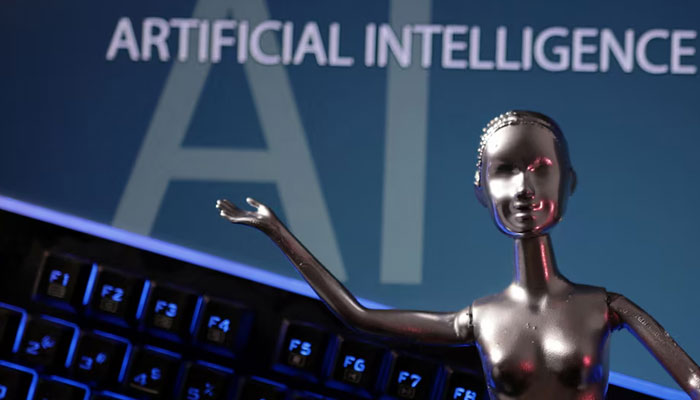AI in education
AI aims to innovate teaching and learning practices, contributing to rapid progress towards UN Sustainable Development Goal
In an era marked by rapid technological advancement, artificial intelligence (AI) has emerged as a transformative force across various sectors. Among the many domains where AI is leaving an indelible mark, education stands out as one of the most promising and challenging frontiers.
AI aims to innovate teaching and learning practices, contributing significantly to the rapid progress towards UN Sustainable Development Goal 4, which focuses on providing inclusive and equitable quality education and promoting lifelong learning opportunities.
By acting as a ‘social resource multiplier’, AI assists in offering students a more personalized and efficient educational journey, thus enhancing societal development. With its potential to address some of the biggest challenges in education today, AI is poised to revolutionize the field.
Unesco is committed to supporting member states in harnessing the potential of AI to achieve its Education 2030 Agenda, which promises ‘AI for all’. In its report, ‘Artificial Intelligence and Education: Guidance for Policy-makers’, Unesco aims to shift the conversation to include AI’s role in addressing current inequalities in access to knowledge and research. It emphasizes ensuring that AI does not widen the technological divide within and between countries. The publication also affirms that the deployment of AI technologies in education should enhance human capacities, protect human rights, and facilitate effective human-machine collaboration in learning and working for sustainable development.
According to Unesco’s Education 2030 Agenda, AI in education is aligned with an inclusive approach along with the involvement of government. Recognizing the impact of data in policy formulation, it underscores the importance of machine and human collaboration while emphasizing privacy and security in AI tools. It takes into cognizance integration of AI-related skills into school curricula and incorporation of ethical considerations, especially in technical and vocational education. It focuses on quality education, regardless of the educational background of the students while supporting trainees with learning impairment and disabilities. Unesco’s agenda also advocates integration of AI skills into Information and Communication Technologies Competency Framework providing support to countries in training the trainers.
Critics of AI in education raise concerns about the potential dehumanization of the educational process, data privacy and biases in AI-driven tools, as well as ethical concerns and the credibility of AI-produced research. These apprehensions must be acknowledged and mitigated to ensure that AI’s use in education is ethical, responsible and effective.
It is pertinent to carry out a comparative overview of distinct approaches adopted by two neighbours of Pakistan, China and India. Both nations are at the forefront of AI adoption, but their approaches differ, showcasing the adaptability of AI to diverse educational contexts. China has embraced AI in the education sector with AI-powered classrooms, with facial recognition and curricula transformation at its core, exemplifying AI’s transformative potential in a nation’s educational development.
Integrating AI into the education of young students is seen as a pioneering solution for how the country can nurture its future AI talent. As early as 2017, the Chinese State Council issued the ‘New Generation of Artificial Intelligence Technology Development Plan’, proposing to carry out AI science popularization activities, implement national intelligent education projects, set up AI-related courses in primary and secondary schools and gradually promote programming education. In China’s Guangzhou province, authorities have included AI in the annual curriculum since September 2023. China is planning to merge Human and AI through Neuromorphic Computing.
India, on the other hand, is employing AI through adaptive learning platforms, personalized courses and intelligent tutoring systems. In 2015, in the Visakhapatnam district of State of Andhra Pradesh, the government collected and analyzed data of students through an AI-based application which found predictive patterns of probable dropouts. The data revealed that thousands of students were likely to discontinue school in the academic year 2018-2019. Such experiments testify to the potential of AI acting as a catalyst in streamlining the education system and helping institutions make better decisions. In 2022, three Indian schools in Hyderabad, Bangalore and Pune incorporated AI in class activities by introducing 21 highly interactive ‘Eagle Robots’ to assist teachers and impart education in 30 different languages and conduct automated assessment.
In recent years, Pakistan has made significant strides in AI education through the President’s Initiative on Artificial Intelligence and Computing (PIAIC). This initiative is training a new generation of AI practitioners. Pakistan has developed a national AI policy draft that consists of four pillars: (i) Enabling AI market; (ii) Enabling AI through awareness and readiness; (iii) Building progressive and trusted environment; and (iv) Transformation and evolution.
While the document emphasizes the fundamental understanding and awareness of personal data protection and AI, it also aims to stimulate an incremental impact of AI on society from the grassroots. Therefore, the policy has given equal importance to teaching algorithms, data science and AI in Science, Technology, Engineering and Mathematics (STEM) education. The policy suggestions include forming a STEM education expert working committee for reviewing the National High-Tech Curriculum Draft.
To successfully leverage AI in education, it is important to emphasize collaborative efforts between educators, policymakers and AI developers. The potential of AI to revolutionize education is vast. A ‘train the trainers’ programme, combined with the necessary infrastructure is vital to maximize AI’s application in education.
The Information and Communication Technologies (ICT) Summit 2003 stated that ICT promises fundamental changes in all aspects of our lives including knowledge. AI is doing the same nowadays. Silicon Valley is the epicenter of AI advancement, collaborating with a number of national academic institutions such as MIT.
In Germany, institutes like the Max Planck Institute for Intelligent Systems are at the forefront of AI research. To encourage and harmonize AI education and training in Pakistan, there is a need to establish AI institutes of higher learning at both federal and provincial levels on priority. The government could therefore consider establishing an AI City in Islamabad and AI universities at provincial levels. We must catch up with the others.
The writer is a research officer at the Center for International
Strategic Studies, Sindh.
-
 Jennifer Garner Drops Parenting Truth Bomb On Teens With Kylie Kelce: 'They're Amazing'
Jennifer Garner Drops Parenting Truth Bomb On Teens With Kylie Kelce: 'They're Amazing' -
 AI Is Creating More Security Problems Than It Solves, Report Warns
AI Is Creating More Security Problems Than It Solves, Report Warns -
 'Game Of Thrones' Prequel 'A Knight Of The Seven Kingdoms' New Ratings Mark Huge Milestone
'Game Of Thrones' Prequel 'A Knight Of The Seven Kingdoms' New Ratings Mark Huge Milestone -
 Apple Seeks To Dismiss Fraud Suit Over Siri AI, Epic Injunction
Apple Seeks To Dismiss Fraud Suit Over Siri AI, Epic Injunction -
 Delroy Lindo Explains The Crucial Role Of Musical Arts In Setting Up His Career Trajectory
Delroy Lindo Explains The Crucial Role Of Musical Arts In Setting Up His Career Trajectory -
 Timothée Chalamet Reveals How He Manages To Choose The Best Roles For Himself
Timothée Chalamet Reveals How He Manages To Choose The Best Roles For Himself -
 Princesses Beatrice, Eugenie’s Conflict Gets Exposed As Mom Fergie Takes Over The Media
Princesses Beatrice, Eugenie’s Conflict Gets Exposed As Mom Fergie Takes Over The Media -
 Kate Middleton Plays Rock-paper-scissors In The Rain
Kate Middleton Plays Rock-paper-scissors In The Rain -
 Lindsay Lohan On 'confusing' Teen Fame After 'Mean Girls': 'I Should Have Listened To My Mom And Dad'
Lindsay Lohan On 'confusing' Teen Fame After 'Mean Girls': 'I Should Have Listened To My Mom And Dad' -
 Savannah Guthrie Mom Update: 'Today' Show Sees Huge Ratings Boost Amid Search For Nancy Intensifies
Savannah Guthrie Mom Update: 'Today' Show Sees Huge Ratings Boost Amid Search For Nancy Intensifies -
 Hillary Clinton To Testify In Epstein Probe Alongside Bill Clinton
Hillary Clinton To Testify In Epstein Probe Alongside Bill Clinton -
 Meghan Markle, Prince Harry End Jordan Trip With Meaningful Hospital Visit
Meghan Markle, Prince Harry End Jordan Trip With Meaningful Hospital Visit -
 AI Boyfriends Gain Popularity In China As Young Women Turn To Virtual Romance
AI Boyfriends Gain Popularity In China As Young Women Turn To Virtual Romance -
 Prince William Receives Reality Check As His Media Strategy Fails
Prince William Receives Reality Check As His Media Strategy Fails -
 Zach Braff Reflects On Doing Odd Jobs Ahead Of Major Career Breakthrough In 2001's 'Scrubs'
Zach Braff Reflects On Doing Odd Jobs Ahead Of Major Career Breakthrough In 2001's 'Scrubs' -
 Google Rolls Out Nano Banana 2 With 4K AI Image Generation
Google Rolls Out Nano Banana 2 With 4K AI Image Generation




